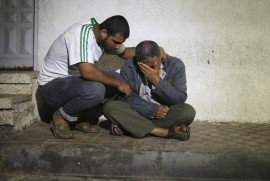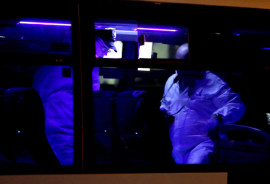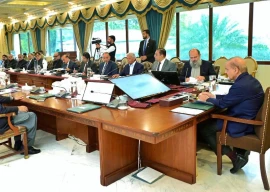
“We cannot compromise the goal of an independent homeland for the followers of Zion. Nor can we talk as long as the Palestinians remained divided.” This argument by a veteran Israeli jurist suggests that between March 2006, when we visited Ramallah and Jerusalem, and early October 2015, when I met this lawyer in Istanbul, the Israeli narrative on Palestinians has hardly changed. In fact, under Prime Minister Benjamin Netanyahu, Israeli views on the treatment of Palestinians have hardened further. No surprise, therefore, that four Israelis and 26 Palestinians, including eight alleged attackers, have lost lives in the worst spell of street violence in Jerusalem since early October. Stirred in part by Muslim anger over increasing Jewish visits to the al-Aqsa mosque, the continued bloodshed prompted Palestinian groups to call for a "Day of Rage" across the West Bank, Gaza and East Jerusalem on October 13. Even the leaders of Israel's Arab community called for a commercial strike in their towns and villages.
The Israeli lawyer, attending a regional security conference in Istanbul, explained that despite Netanyahu’s best efforts, the situation remains bleak for Palestinians because they have no leader. According to him, Israel is ready to make space for Palestinians and help them get their state. It is ready to negotiate the displacement of some of the Jews living in the new settlements but there is no interlocutor. Some of the incidents of stabbing, by outraged Palestinian youth, have taken place around Pisgat Zeev, built on occupied land that Israel annexed to Jerusalem after the 1967 Middle East war. Nearly half a million Jews live on lands annexed in this way. The Palestinian president, is too old and helpless, the lawyer argued. But strangely, though not unexpectedly, the Israeli ‘human rights defender’ only talked of the violence by the Palestinians and the division within their ranks.
As he spoke during the lunch break, a delegate from South Korea also interjected with her critical view of the situation in Jerusalem. She said that the perception the world has is one of how miserably the Palestinians are being treated and how they live virtually like hostages of the mighty Israeli army. Aren’t the settlements on annexed lands the real issue of contention, she quipped. The Israeli delegate responded that you may have your perceptions but I will tell you the reality, which is that Palestinians have to put their house in order to get some of the land back. This reminded me of similar discussions I had with Shimon Peres and a few Israeli officials over nine years ago. They projected a certain degree of arrogance and self-righteousness anchored in the belief that Washington and its major allies support them. Peres and others had then defended repeated incursions into Gaza and Ramallah as “our right to secure our borders and people against terrorists”. But most Israelis don’t even admit that what the Palestinians have got as a result of the 1993 Oslo accords are at best modern ghettos, which remain under constant surveillance by a brutally uncompromising Israeli security apparatus.
Palestinians, on the other hand, say that they hardly have any freedom: their prime minister cannot leave his home, and his ministers are confined to Gaza rather than Ramallah. Nobody can move without Israeli permission, said Laila Tooba, a commerce student at the Palestine National University. There are restrictions and the Israelis can intrude with tanks and gunships any time, Tooba had told me in Ramallah, in 2006. The Israeli leadership tells its people — as did Peres then and the lawyer now — that the Palestinians can get over 90 per cent of the territories Israel occupied in 1967. But the reality is that the Palestinian territories (under the Oslo accords) bordering Jordan, Syria (Golan Heights) and Lebanon, remain under tight surveillance. “We are surrounded by enemies and really can’t take security for granted,” an official of the Israel Project, a PR firm that highlights the risks Tel Aviv faces from the hostile environment, had told me then.
Israel’s paranoia is embedded in the presumption that whether Syrian, Jordanian, Egyptian or Lebanese, Muslims will always attempt to instigate Israel’s demise. It is this apprehension that shapes the Israeli self-righteous indifference to the Palestinians, its inflexibility on new Jewish settlements and its narrative of existential threats that surround it. This nearly constant mindset leaves little hope for the healing of this festering wound of the Middle East. There can be no peace, even in the distant future.
Published in The Express Tribune, October 14th, 2015.
Like Opinion & Editorial on Facebook, follow @ETOpEd on Twitter to receive all updates on all our daily pieces.































































COMMENTS (6)
Comments are moderated and generally will be posted if they are on-topic and not abusive.
For more information, please see our Comments FAQ